|
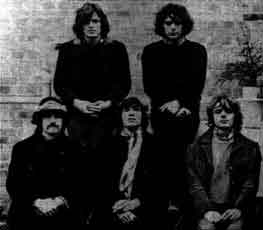
 DAVID GILMOUR
DAVID GILMOUR
 NICK MASON
NICK MASON
 ROGER WATERS
ROGER WATERS
 SYD BARRETT
SYD BARRETT
 RICK WRIGHT
RICK WRIGHT

THE
STORY
The band formed in 1965 when a group of friends (Roger Waters,
Rick Wright and Nick Mason) decided to cover some R&B songs. They called
themselves Sigma 6. They were hooked, but success was not to be theirs just
yet. They played under many names, such as The T-Set, The Meggadeaths, The Architectural
Abdabs, and The Screaming Abdads.
Later that year Waters, thinking they needed a new sound, brought in a friend
from High School. His name is Syd Barrett. Barrett gave them the name we all
know them by now, Pink Floyd, after two American Blues musicians, Pink Anderson
and Floyd Council.
Very rapidly, the Floyd grew an underground following. Syd Barrett began to
show his creative genius in lyrical, and sometimes witty ways. Despite their
"cult" status, they would sometimes have beer bottles and other things thrown
at them on stage. The reason for this is something which has not changed as
the Floyd has developed (although no one throws things anymore), they would
often play very extended versions of songs, like a forty minute version of "Interstellar
Overdrive".
But still, the band's popularity was growing. While playing in the underground
London club scene, it wasn't too uncommon to see The Floyd headlining with the
likes of Jimi Hendrix. Their first released single was "Arnold Layne", and rapidly
flew up the charts.
The band reveled in their newfound popularity. All this time, however, Syd Barrett
was drawing apart from the band. He regularly lost himself in LSD daydreams,
and started developing some mental health problems at about the same time. Towards
the end of his stay with Pink Floyd, he was known to stand on stage strumming
a single chord while staring into the lights, or just to detune his guitar while
playing. It is also said that the band would have to take him offstage at the
end of a concert and wipe the drool from his mouth. This was rapidly becoming
too much for the rest of the band. Syd had to go.
The search for a new guitarist was something that the band thought would take
the popularity from them that they had. Roger Waters wanted to initially ask
Jeff Beck to take over for Syd, but was afraid he'd say no. It finally came
down to the band taking in long time friend and folk-blues guitarist, David
Gilmour. Syd Barrett reluctantly left the band, and was checked into a sanitarium
a short time later.
The band had a new problem before them, and that was finding their style of
music. The first few years from this new lineup revealed a diversity in music
that has to be heard to be believed. After doing a couple of soundtracks for
foreign films, the band released "Meddle". It is from this very album that the
well known sounds of Pink Floyd started to develop.
Through the early seventies, the band gained a larger and larger foreign audience
- namely in the United States. In 1973, their fame began to apex with the release
of "Dark Side of The Moon". This new project showed a different band. All members
of the band had matured artistically since they had first played together nearly
a decade before. Waters had become an accomplished lyricist, and Gilmour had
become a much respected guitarist. And it was these two prevelant personalities
that would come to odds with each other the most.
It was also at this time that the band began to know what fame and fortune can
bring, tension. It started to become apparent that there was a struggle between
Roger Waters and the rest of the band. He threatened to walk out on the recording
of the album, and also on the following tour.
The band then started to record the classic, "Wish You Were Here". It was released
in 1975. David Gilmour later speaks of this album as being a "Thank You" to
Syd Barrett for his guidance and wisdom in the early years of the band. Much
to everyone's surprise, Barrett showed up in the middle of recording, nearly
seven years after leaving the band. He no longer resembled the sheik looking
rock star he once was, though. He had lost most of his hair, put on much weight,
and didn't seem to have the same personality. Needless to say, this was very
inspirational to the band and it can be heard in every song off of that album.
In 1976, "Dark Side of The Moon" had entered Billboards Top 200, nearly three
years after its release. And most certainly, no one expected it to stay on the
charts for the thirteen consecutive years that it did (until 1989).
Sounds of strife settled down for a while then. "Animals" was released in 1977,
and was met with respectful popularity.
In 1978, they began work on "The Wall". Early in the recording of this album,
Gilmour approached Waters with a complete instrumental song that he had played
for the rest of the band. After listening to it, Waters said that he hated it
and wouldn't have it on his album - he considered the music to be "childlike
and simplistic". The rest of the band stood up for this song, and demanded that
this song be included or they would walk. Reluctantly, Waters accepted. He put
together the lyrics in less than half and hour. The song is "Comfortably Numb".
Only two weeks after this fiasco, Waters "fired" Richard Wright and the band
was now a trio.
"The Wall" was released in 1979, and met with world wide success, as did the
movie production of the same name. A massive tour followed, as did the rumors
from the media. A few people, who were ridiculed immediately for thinking so,
saw the band breaking up soon.
In 1983, amidst the rumors of turmoil in the band, Pink Floyd released "The
Final Cut". The name so ironically characterized the present status of the band.
Some people, the rest of the band included, considered it to be a Waters "solo"
album. On this album, no song was co-written with another band member. Indeed,
much of the sound and emotion that gelled the band together seemed to be missing.
After a very punctuated tour and a U.K. mini-movie, no one heard from the band
for two years. Then in late 1985, Waters left the band and immediately sued
the remaining band members for exclusive rights for all the works of Pink Floyd,
including the name. The fight was long and messy, lasting over a year. Finally,
in 1987, a decision was made. The judge said that Waters had left the band of
his own free will, and since the band never entirely broke up, the rights to
most of the material belonged to what was left of the band. However, Waters
did receive a partial decision in his favour. He was to receive royalties for
what he had worked on. Neither side entirely satisfied, but it was over....
In September of 1987, Pink Floyd (Gilmour and Mason, with Wright as a paid musician)
released "Momentary Lapse of Reason". Originally intended as a solo album for
Gilmour, he wanted the album to be done as a whole. Some fans embraced this
new album, saying that the spirit of the band was still alive. On the other
hand, some fans turned their backs entirely to this new project from The Floyd.
A very successful tour followed, though, and it seemed that the band was as
popular as ever.
Waters also was having success of his own. He released The Pros and Cons of
Hitchhiking in 1984, Radio K.A.O.S. in 1987, and Amused to Death in 1992. The
albums sold well, and had very sucessful tours. And when the Berlin Wall came
down in 1989, Waters orchestrated a star studded performance of "The Wall" in
a now unified Germany. Performers for this gala event included Bryan Adams,
Thomas Dolby, Cyndi Lauper, and a very special appearance by the infamous Vera
Lynn.
In 1994, The Floyd released "The Division Bell", which went to No. 1 on the
American charts.
And through this deep and winding history there are still many things that are
unknown. The wounds in the band run deep, and only time will tell of what is
yet to come.

 David
Jon Gilmour was born on 6th March, 1946. He is the youngest Pink Floyd member.
As the lead guitarist of Pink Floyd, he's one of rock's most distinctive players
with his use of echoes, delays, and distorted sustain. He joined the band in
'68 - after he already had established a reputation as a guitarist and vocalist
in the group "The Jokers Wild" - in order to "support" the ailing Syd Barrett
(the idea was, according to Roger Waters, to let Syd carry on writing songs,
but have Dave actually do Syd's part live), but Syd was to soon leave and so
Dave took over as lead guitarist, and also took over some of the singing. David
Jon Gilmour was born on 6th March, 1946. He is the youngest Pink Floyd member.
As the lead guitarist of Pink Floyd, he's one of rock's most distinctive players
with his use of echoes, delays, and distorted sustain. He joined the band in
'68 - after he already had established a reputation as a guitarist and vocalist
in the group "The Jokers Wild" - in order to "support" the ailing Syd Barrett
(the idea was, according to Roger Waters, to let Syd carry on writing songs,
but have Dave actually do Syd's part live), but Syd was to soon leave and so
Dave took over as lead guitarist, and also took over some of the singing.
Right up to "The Dark Side of The Moon", Dave was also writing his own songs,
but from there to "The Final Cut", Roger Waters took over in the Lyrics department.
Dave, released, perhaps reluctantly of this responsibility, did make up for
it by producing some excellent Guitar, and production work on all those albums,
most notably Shine On You Crazy Diamond (from "Wish You Were Here") and Comfortably
Numb (from "The Wall"). He also did a large amount of the vocals, and it can
be argued that he's probably got the best singing voice in the band.
His solo efforts have done well, with his self-titled debut reaching #29 and
follow-up About Face hitting #32 on the charts.
After Roger Waters decided to officially leave the group, Nick Mason and Dave
subsequently decided to record an album under the Pink Floyd name. Waters, who
thought the name best layed to rest, sued them over its use. The two parties
eventually reached a settlement before the matter ever reached court.

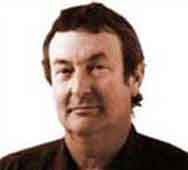 Nicholas
Berkeley Mason was born on 27th January, 1945. Percussionist, like Roger
Waters, Nick started playing in the group "The Abdabs"(1965). He's the
only member of the original and to still be playing in it. Nicholas
Berkeley Mason was born on 27th January, 1945. Percussionist, like Roger
Waters, Nick started playing in the group "The Abdabs"(1965). He's the
only member of the original and to still be playing in it.
One of Nick's hobbies is cars. According
to Autoweek, some of the cars that he owns(and races) are: Ferrari 250
GTO, F40 and 246 GTS Dino, Bugatti 35B, Alfa 2300 and Maserati 250F. We
can see clearly this hobby in one movie featuring a Pink Floyd-made soundtrack
"La Carrera Panamericana", about a race in Mexico, in which Nick, Dave
and Steve O'Rourke raced.

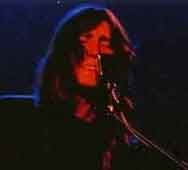 George
Roger Waters was born on 6th September, 1943. A few artists showed a cloudy
and depressed vision of the modern society like him. Many of his songs are about
the Second World War, where his father, Eric Fletcher Waters (to whom "The Final
Cut" was dedicated) died during the British invasion of Anzio, Italy. George
Roger Waters was born on 6th September, 1943. A few artists showed a cloudy
and depressed vision of the modern society like him. Many of his songs are about
the Second World War, where his father, Eric Fletcher Waters (to whom "The Final
Cut" was dedicated) died during the British invasion of Anzio, Italy.
Roger Waters started playing in the group "The Abdabs" (1965), which later evolved
to Pink Floyd. After the absence of Syd Barrett, he gradually began to take
more control over the Floyd's lyrics, until "The Dark Side of The Moon", where
all lyrics are his. This vein continued through "Wish You Were Here", and "Animals",
until "The Wall", where he began to take control over the music side of things
too. For "The Final Cut", its often been said that this is Roger with a few
famous backing musicians, as the album is almost totally "his own work".
After The Final Cut, Roger left the band, and expected the others to do likewise,
but was surprised to find them wanting to carry it on. In the mid 80s, he engaged
in a protracted legal battle, arguing that the other members of Pink Floyd could
not continue using the name without him in the band. A few law suits were involved,
but resulted in Rog getting not as much as he expected.

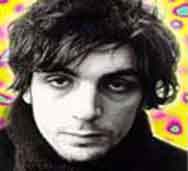 Roger
Keith Barrett was born on 6th January, 1946. Like other guys of his age, when
he was younger he got the nickname "Syd", which he used even when older. It
was Syd who gave Pink Floyd its name, from albums by two Carolina blues artists,
Pink Anderson and Floyd Council, that were in his collection. Roger
Keith Barrett was born on 6th January, 1946. Like other guys of his age, when
he was younger he got the nickname "Syd", which he used even when older. It
was Syd who gave Pink Floyd its name, from albums by two Carolina blues artists,
Pink Anderson and Floyd Council, that were in his collection.
Like a supernova, Roger "Syd" Barrett burned briefly and brightly, leaving an
indelible mark upon psychedelic and progressive rock as the founder and original
singer, songwriter, and lead guitarist of Pink Floyd. In mid-66, when Floyd
began to attract attention, they had almost exclusively Barrett compositions.
The success that followed their first two singles and "The Piper At The Gates
Of Dawn" proved to be too much for Syd, however, as the vast quantities of drugs
he was taking in, the blind worship of his fans, the pressure of writing hit
singles (his third attempt, "Apples and Oranges", was a flop), and other factors
all made him unpredictable on stage and in the studio. Such was his stature
within the original lineup that few observers thought the band could survive
his departure; in fact, the original group's management decided to keep Syd
on and leave the rest of the band to their own devices. The other members of
the group decided to bring in an additional guitarist to cover for Syd, and
thus David Gilmour was asked to join the band.
Roger Barrett currently resides in suburban Cambridge. He lives a fairly isolated
existence, his affairs looked after by his sister, and spends his time painting,
reading, tending his garden and coin collection, and working on a pet-project
of his, "The History of Art." The money from his Pink Floyd and solo albums
is more than enough to subsidize his low-key lifestyle. Though there are occasional
"Syd sightings," Mr. Barrett finds it difficult to relate to and communicate
with other people, and anyone attempting to track him down is likely to meet
with a closed door.

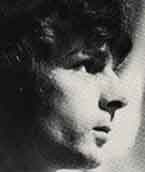 Richard
William Wright was born on 28th July, 1945. Playing the keyboards, he started
on "The Abdabs" (1965). He's managed to find time to write and sing a
number of the Floyd's ditties, like The Great Gig in the Sky ("The Dark Side
of the Moon"). After many years with Pink Floyd, he was forced out the band
during the sessions for "The Wall". Richard
William Wright was born on 28th July, 1945. Playing the keyboards, he started
on "The Abdabs" (1965). He's managed to find time to write and sing a
number of the Floyd's ditties, like The Great Gig in the Sky ("The Dark Side
of the Moon"). After many years with Pink Floyd, he was forced out the band
during the sessions for "The Wall".
Being paid on a wage, he was the only "member" of Pink Floyd to actually make
money on that tour. He did not appear on "The Final Cut". He did, however, appear
as a "session" musician on "A Momentary Lapse of Reason", and also participated
in the "Delicate Sound of Thunder" tour. With "The Division Bell" he's finally
fully back in the band.

|